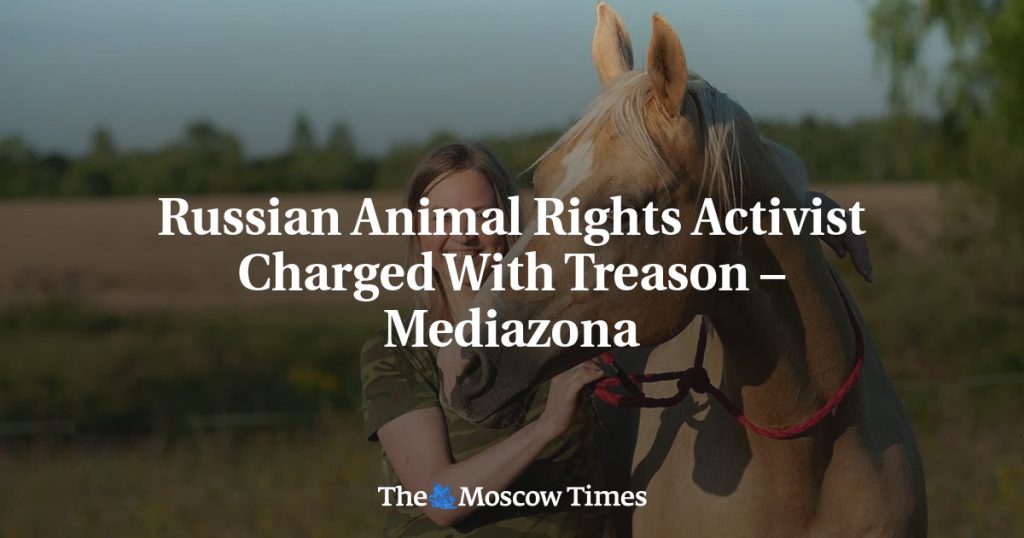An animal rights activist from the Moscow region, Yevgenia Konforkina, is facing criminal charges of treason. Federal Security Service (FSB) agents raided her family’s home in Lyubertsy, where they reportedly broke in with a group of 15 people, causing fear and distress for her elderly mother. The agents mocked the family’s modest lifestyle and asked about their views on the war in Ukraine. Moscow’s Meshchansky District Court decided to place Konforkina in pre-trial detention, but her family does not know the specifics of the accusations against her, and the court’s press service declined to comment. Konforkina’s mother was interrogated by the FSB as a witness in the investigation of her daughter, who could face up to 20 years in prison if found guilty.
Konforkina’s family revealed that an investigator contacted them to inform them that Yevgenia denied her guilt in the case. She was described by her former employer at a horse stable in Lyubertsy as an avid animal lover who had previously worked to help rescue horses from Russian airstrikes in Ukraine. This suggests that her activism and efforts to protect animals may be linked to the charges of state treason that she is facing. The exact nature of the accusations remains unclear, and Konforkina’s family is left in the dark about the details of the case. The situation has sparked concerns about the crackdown on activists and dissent in Russia, where independent journalism faces challenges and censorship.
The case of Yevgenia Konforkina highlights the precarious situation facing activists in Russia, where speaking out against government policies can lead to serious repercussions. The FSB raid on her family’s home and subsequent detention point to the oppressive climate for those who advocate for animal rights or other causes deemed threatening by the authorities. Konforkina’s dedicated work in animal rescue and protection may have put her in the crosshairs of the state, as her actions were viewed as potentially undermining the government’s interests. The lack of transparency in the legal process and the potential severity of the charges raise concerns about the rule of law and due process in Russia.
The targeting of individuals like Yevgenia Konforkina reflects broader trends in Russia, where dissent and activism are increasingly suppressed. The use of state treason charges to silence critics and human rights defenders is a tactic that has been employed by the authorities to stifle opposition and discourage independent voices. The repressive measures against activists not only have a chilling effect on civil society but also contribute to a climate of fear and intimidation. The media’s role in reporting on such cases is crucial in shedding light on the injustices faced by individuals like Konforkina and holding the government accountable for its actions.
The international community’s response to cases like that of Yevgenia Konforkina is essential in putting pressure on the Russian government to uphold human rights and protect individuals’ freedoms. Support from organizations and governments that advocate for human rights can help raise awareness about the plight of activists and dissidents in Russia, whose fundamental rights are at risk in an increasingly authoritarian environment. By shining a spotlight on these cases and calling for justice and accountability, the global community can send a strong message that the targeting of activists will not go unnoticed or unchallenged. Solidarity with individuals like Konforkina is crucial in standing up against injustice and defending the rights of all citizens to speak out and advocate for causes they believe in.
In conclusion, the case of Yevgenia Konforkina underscores the challenges faced by activists in Russia, where the authorities’ crackdown on dissent threatens the fundamental rights of citizens to express their views and engage in advocacy. The use of state treason charges against individuals like Konforkina is a troubling development that reflects a broader trend of repression and intimidation aimed at silencing critical voices. By raising awareness about cases like this and pushing for accountability and justice, the international community can support activists and defenders of human rights in Russia and send a clear message that such abuses will not be tolerated. Solidarity and support for individuals like Konforkina are crucial in defending the principles of freedom of expression and peaceful activism in an increasingly hostile environment.














